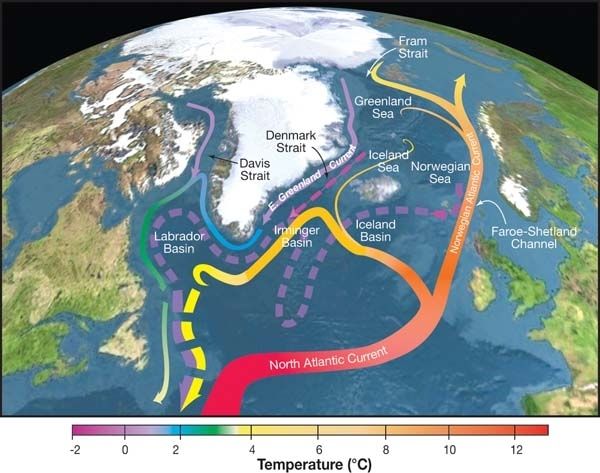
Global warming: ocean circulation in the Atlantic may be affected less than expected
The ocean circulation in the Atlantic Ocean favors a temperate climate in Europe
Among the effects of global warming, one of the most important is certainly the modification of ocean currents, particularly in the Atlantic. The waters of this ocean are currently subject to intense mixing, which includes both deep and surface currents. This large-scale circulation of the oceans is called brining. It is actually caused by the extreme differences in salinity and water temperature that exist between different regions of the world. These differences in temperature and salinity result in density variations that ensure the functioning of large convective cells.
On the surface we find warm salt water in the South Atlantic. Ascending northward, this surface water will gradually become denser, due to cooling atmospheric temperatures but also due to the large supply of fresh water from melting ice in the polar regions. In the North Sea and the Labrador Sea, this upper layer of water can become denser than the layer of lower water, which will begin to sink into it. The deep currents will then drive this mass of water towards the south, where part of it will rise, particularly in the Antarctic Ocean.
Map showing ocean current crossing the North Atlantic, with temperature evolution. Solid curves represent surface currents, and dotted curves represent deep currents © R. Curry, Woods Hole Oceanographic Institution/Science/USGCRP, Wikimedia Commons, CC BY 3.0.
This large oceanic ring that transports warm water to the North Atlantic Ocean has a strong influence on the climate of this region. This heat transfer already ensures a fairly temperate climate for the countries of the northern hemisphere bordering the Atlantic Ocean, in particular, for the countries of Western Europe.
>> Read also: This is what the Earth would look like if the oceans were emptied
Ice melting affects the intensity of ocean circulation
If this Atlantic circulation affects the climate in France, it also appears to be highly sensitive to global climate changes. The warming we are currently seeing is causing a massive melting of the Arctic ice cap, releasing massive amounts of fresh water into the North Atlantic. Thus, many climate models warn of a sudden change in the ocean circulation, under the influence of this change in the salinity of the waters of the Atlantic Ocean. Thus a change in this ocean circulation could have a significant impact on the climate of the Northern Hemisphere. The consequences of weakening or even stopping the circulation of the Atlantic Ocean will already have a significant impact on the living conditions in this region. Such a scenario in particular could lead to a rapid rise in sea level along the eastern coast of North America and lower temperatures in Europe, which could harm our agriculture. The effect could be more global, with less rainfall in the Amazon rainforest and a change in the monsoon cycle in Asia.
If the Atlantic Ocean’s circulation stops, Europe could experience a drop in temperatures © justoomm, Sutterstock
This type of disorder has already been observed in the past. 14,700 years ago, a rapid global rise in atmospheric temperature could have halted ocean circulation in the Atlantic. This climate event is known as the Pauling-Allerud warming and its consequences for ocean convection cells have been successfully modeled.
But this is not the only climate crisis the Earth has experienced in the past 10,000 years. The impact of these various outbursts of warming is well recorded in the ice of the polar regions, which are real archives of the Earth’s climate. However, the current climate model has not been able to accurately simulate these different recent climate events, resulting in gaps in the model.
Ocean circulation is less sensitive than expected
Two scientists then focused on developing a new simulation model to calculate the evolution of climate over the past 10,000 years. The results are published in the journal The nature of climate change. In this model, scientists have made adjustments, mainly at the level of factors that are supposed to be at the origin of the blockage of the Atlantic circulation.
While it was believed that large flows of fresh water from massive melting of ice were responsible for the temporary halt in ocean circulation during these climate crises, Feng He and Peter Clark suggested that ocean currents in the Atlantic would be lower. Sensitive than previously thought to this influx of fresh water. Their simulations show that by preserving the natural ocean circulation to some extent, the model results are in agreement with climatic observations.
The results of this study suggest that current global warming will have a less severe impact on the Atlantic circulation than predicted by ancient evolutionary models.
By proposing a less dramatic reduction in Atlantic circulation, the new model she and Clark are developing suggests that some of the indirect consequences of global warming may be less serious than expected.
However, scientists are still far from perfecting all the parameters involved, and the authors caution that these are just simulations, which should be interpreted with caution. Because scientists are currently unable to explain why the Atlantic Ocean circulation stopped during certain previous crises and not during others.
One thing is for sure: global warming will affect ocean circulation in the Atlantic. The question is how severe.
>> Read also: Is the ocean in danger of becoming sterile?

“Organizer. Social media geek. General communicator. Bacon scholar. Proud pop culture trailblazer.”


